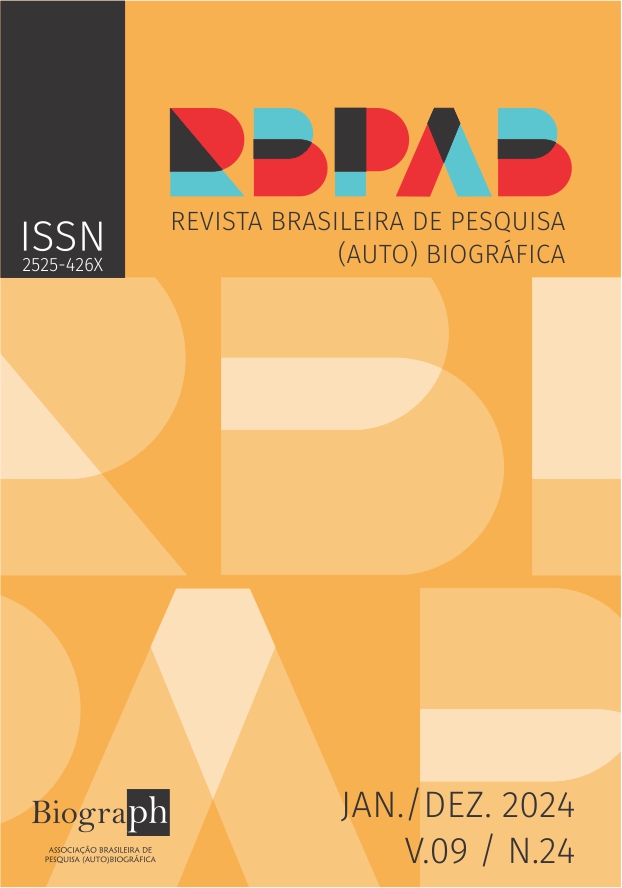Heroes in campus of battle: biographical representations of university professors during the Culture Wars
DOI:
https://doi.org/10.31892/rbpab2525-426X.2024.v9.n24.e1199Keywords:
Contemporary literature, American literature, Culture Wars, Self-fashioning, AutofictionAbstract
Analyzing the representations of university professors as outlined by some artistic works published in the context of the Culture Wars, during the 1990s and 2000s in the USA, the aim of the present paper is to indicate a series of characteristics shared by such representations and their possible contextual motivations. The corpus of this imagological analysis covers the following works: The Human Stain, by Philip Roth; Ravelstein, by Saul Bellow; the documentary Derrida, by Kirby Dick and Amy Ziering Kofman; the biography Derrida, by Benoît Peeters; and Stoner, by John Williams. After suggesting the sociohistorical reasons behind certain similarities in the representations of university professors in this American context, involving secrets, scandals and spectacularization, it will be indicated how these works use complex discursive strategies to promote awareness about a process of self-fashioning, not only from the perspective of their characters and narrators, but also from their authors themselves. At the end of the exhibition, the possibility of bringing this notion of self-fashioning closer to what contemporary literary criticism has called autofiction is presented and discussed.
Downloads
References
ADLER, Eric. Classics, the Culture Wars, and Beyond. Ann Arbor: University of Michigan Press, 2016.
ARAÚJO, Nabil (org.). Imagens em discurso II: escrita do outro como escrita de si. Belo Horizonte: FALE/UFMG, 2020.
BELLOW, Saul. Ravelstein. Tradução de Léa Viveiros de Castro. Rio de Janeiro: Rocco, 2001.
BERNAL, Martin. Geography of a Life. Bloomington: Xlibris, 2012.
BLOOM, Allan. O declínio da cultura ocidental: Da crise da universidade à crise da sociedade. Tradução de João Alves dos Santos. São Paulo: Best Seller, 1989.
BLOXHAM, John. Ancient Greece and American Conservatism. London; New York: I. B. Tauris, 2018.
BRANDÃO, Jacyntho Lins. O fosso de Babel. São Paulo: Nova Fronteira, 1997.
CUSSET, François. French Theory: Foucault, Derrida, Deleuze & Cie et les mutations de la vie intellectuelle aux États-Unis. Paris : Éditions de la Découverte, 2003.
DERRIDA. Direção de Kirby Dick e Amy Ziering Kofman. Jane Doe Films, 2002. 1 DVD (86 min.).
GREENBLATT, Stephen. Renaissance Self-Fashioning: From More to Shakespeare. Chicago; London: The University of Chicago Press, 1980.
GREENE, Thomas. The Flexibility of the Self in Renaissance Literature. In: DEMETZ, Peter; GREENE, Thomas; NELSON, JR. Lowry (Ed.). The Disciplines of Criticism: Essays in Literary Theory, Interpretation, and History. New Haven; London: Yale University Press, 1968, p. 241-264.
HALLETT, Judith P.; NORTWICK, Thomas Van (Ed.). Compromising Traditions: The personal voice in classical scholarship. London; New York: Routledge, 1996.
HANSON, Victor Davis; HEATH, John. Who Killed Homer? The Demise of Classical Education and the Recovery of Greek Wisdom. New York; London; Toronto; Sydney; Singapore: The Free Press, 1998.
HOMERO. Ilíada. Tradução e prefácio de Frederico Lourenço – São Paulo: Penguin Classics Companhia das Letras, 2013.
KLINGER, Diana. Escrita de si como performance. Revista Brasileira de Literatura Comparada, n. 12, p. 11-30, 2008.
KLINGER, Diana. Escritas de si, escritas do outro: o retorno do autor e a virada etnográfica. 3. ed. Rio de Janeiro: 7Letras, 2016.
PAGEAUX, Daniel-Henri. Elementos para uma teoria literária: imagologia, imaginário, polissistema. Trad. de Katia A. F. de Camargo. In: PAGEAUX, Daniel-Henri. Musas na encruzilhada: ensaios de literatura comparada. São Paulo; Santa Maria: EdURI; Hucitec; EdUFSM, 2011, p. 109-27.
PEETERS, Benoît. Derrida: biografia. Trad. André Telles. Rio de Janeiro: Civilização Brasileira, 2013.
PEETERS, Benoît. Trois ans avec Derrida: Les Carnets d’un biographe. Paris : Flammarion, 2010.
ROTH, Philip. A marca humana. Tradução Paulo Henriques Britto. 1. ed. São Paulo: Companhia de Bolso, 2014.
SIN-LÉQI-UNNÍNNI. Ele que o abismo viu: epopeia de Gilgámesh. Tradução do Acádio, introdução e comentários Jacyntho Lins Brandão. 1. ed. Belo Horizonte: Autêntica Editora, 2017.
WELLBERRY, David. The Specular Moment: Goethe’s Early Lyric and the Beginnings of Romanticism. Stanford: Stanford University Press, 1996.
WILLIAMS, John. Stoner. Tradução Marcos Maffei. Rio de Janeiro: Rádio Londres, 2015.













































